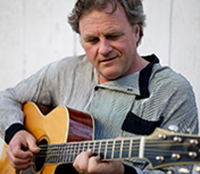|
|
Liner Notes To "Fruit on the Vine" by Harvey
Reid

These liner notes do not exist anywhere else. Harvey decided
there was not really that much to say about the music on the CD, and after writing
the liner notes, decided not to include them in the CD, and to let people wonder
what the songs meant, and to let the music speak for itself. Right or wrong,
that is what happened, and here is what would have been in the CD.
1- Macallan's Jig (H. Reid) [4:12] Written during the recording of this
album. In fact, it was finished and recorded the night before the mastering
session, the ultimate in last-minute, like cramming for an exam . It is the
sequel to the Star Island Jig, and might be even harder to play. [HR: 6-string
Larrivee C-10 with Esus capo, tuned -1] [Recorded: May 21, 1998 York, ME DAT]
2- I Have Finally Found A Home (H. Reid) [3:47] I wrote this on an October
day while driving a rental car across Indiana with a head full of Bluegrass
music and a serious dose of sleep deprivation from a Bluegrass festival. It
is for a dear old friend who has been a complete musical gypsy for more years
than I, and who has lived nowhere and nearly everywhere (but usually someplace
like Cleveland or St Louis) for years, finally figured out where he wants to
live and had just told me of his plan to finally drop anchor. Anne and Matt's
parts were recorded in their living room, when I dragged a recording rig up
to their house 120 miles away. Capo 2+ Asus. (L) [HR: guitar& vocal, Anne
Dodson: vocal & wood whistle, Matt Szostak: hurdy gurdy, Gary Sredzienski:
accordion] [Recorded: May 1998 Fishtraks, Anne Dodson's Living Room. ADAT]
3- Times Gone By (H. Reid/ B. Silber) [4:20] I found this chord progression
and a sketch of part of this melody on a work tape, and it leaped out as a full-blown
melody when Brian and I got together on a February evening in Maine. I also
play it as a solo autoharp piece, since its rhythm and melodic flow are very
suited to the instrument's mechanics. It evokes images for me of Victorian times.
[HR: autoharp, Brian Silber: violin] [Recorded: May 10, 1998 York, ME DAT]
4- Silver Midnight Moon (H. Reid) [4:00] This is not a simple song, and
I am not sure I can give any particular insight into it. It's sort of a moon
song, but goes into a lot more issues than most moon songs. Capo Esus. Standard
tuning, tuned -2 to D. BF. [Recorded: Sat, Jan 17, 1998 York, ME DAT]
5- The Magnolia Promenade (H. Reid) [3:15] This was supposed to be a
tribute to Merle Travis, though it got out of control, drank coffee, ate sugar
and ran off with the circus. It became almost a Sousa march. It reminds me of
the South, and since I used to live there, I feel qualified to occasionally
write such a tune. This is now #4 in my series of such ragtime guitar tunes.
It took its name during a walk under the magnolia trees on the Grand Promenade
in Hot Springs, Arkansas. Sousa already wrote a march called the Grand Promenade
I learned. [Standard tuning, tuned-1.] [Recorded: Mon, Apr 6, 1998 York, ME
DAT]
6- Babylon Is Fallen (Trad.) [2:20] This is a Sacred Harp song, that
is in the official hymnal from 150 or so years ago. I doubt Lynn and I do the
harmonies by the book, but duet singing has a different set of rules than larger
ensembles. It's legal to just grab any good note if you like it. I learned this
from the singing of a West Virginia band called Hickory Wind, and am permanently
inspired by having heard Helen and Rikki Schneyer do it years ago with Jonathan
Eberhart on bass vocal. [HR: guitar, vocal, Lynn Rothermich: vocal] [Recorded:
Sun, Jul 23, 1995 York, ME DAT]
7- The Great Pyramid (H. Reid/ B. Silber) [3:57] This started out and
floundered around as a solo bouzouki piece, but came to life when combined with
the violin. It's a lot of sound for two small instruments. I have no idea what
inspired it- just the sound of the big mandolin one beautiful summer day. It's
sort of Mediterranean Celtic Grisman Gypsy music. [HR:octave mandolin, Brian
Silber: violin] Engineering: Rick Watson at Fishtraks, Portsmouth NH. [Recorded:
May 11, 1998 York, ME DAT]
8- Farewell To The Gold (P. Metsers) [5:46] An Australian gold mining
song, written in the 70's I think, and lifted directly from Nic Jones' classic
1980 version. I bought this little Larrivee guitar because I thought I might
be able to get it to sound a lot like Nic, though only in my dreams could I
play like him. I was just enjoying this song at the time when this project happened,
and it hitched a ride. I sometimes let a song jump into an album project for
no apparent reason, to keep there from being too much of a theme or a plan.
I admire true ballad singers, who deliver a heartwrenching story in an achingly
controlled and detached way. It's an ancient thing, that I wish I was better
at. This is one of my best efforts yet to do this. [HR: guitar & vocal]
[Recorded: Wed, Jan 28, 1998 York, ME DAT]
9- In Dark Winter Rejoiceth (H. Reid) [3:30] Written for the winter solstice.
The autoharp can play uplifting, straight-tempo hymn-like things more effectively
than the other instruments I play. It's usually performed as a solo autoharp
piece, and does not need the piano to work. It probably needs hymn-like words,
too, and I could imagine a choir singing this piece if it had them. [HR: autoharp,
Rick Watson: keyboard] [Recorded: Fri, Apr 3, 1998 York, ME DAT/ADAT]
10- The Lucky Penny (H. Reid) [4:13] I can't think if I ever heard a
jig rhythm played frailing-style on a banjo. This is a not a "real"
banjo (it has a guitar neck and 6 strings tuned in guitar tuning) and this is
not real frailing, which may be why it works. Towards the end you hear the fingerpicks
clicking and slapping the strings like a hammered dulcimer. First sketched out
in 1990 during the recording of "Steel Drivin' Man," this was completed
shortly before it was recorded in April '98. Capo 7 + Open A. [HR: 6-string
banjo] [Recorded: April 14, 1998 York, ME DAT]
11- It's A Banjo Playing (H. Reid) [2:17] This most likely would sound
good (and possibly best) with a bluegrass band treatment, which I try to imply
here rather than actually do. It essentially describes (and borrows) the essence
of bluegrass music, and the lyrics are a long series of Jeopardy clues that
would all be answered "What is bluegrass music?" Hopefully it should
have a similar overall effect, just smaller, and a little less lonesome. It
almost got a band treatment here, and fought off a harmony vocal right at the
end of the project to remain solo. I do love the banjo. [HR: Guitar, capo 2,
vocal.] [Recorded: May 1998 York, ME DAT]
12- Above The Clouds (H. Reid) [3:17] I have no idea what kind of music
this is or where it came from, but it sure feels good to play it bottleneck
style. It's easy to think of slide guitar and the metal-body instrument as only
suitable for blues. They can make sweet and dreamy music also. It's a nice piece
to play in Open D tuning. [Recorded: Mon, Apr 6, 1998 York, ME DAT]
13- Aragon Mill (Si Kahn) [3:48] A fine example of a milltown song. This
one should be better known than it is-- it is simple and poignant and easy to
play and sing in casual jam sessions. It's too perfectly written to be traditional,
though it sounds it. Simon Kahn is a pretty well-known social-activist folksinger
and a fine songwriter with quite a few records out. [HR: guitar & vocal,
David Surette: mandolin, Lynn Rothermich: harmony vocal, Kent Allyn: bass] [Recorded:
Wed, Aug 9, 1995 York, ME DAT]
14- Lindsay Road (H. Reid) [2:46] This is a mandolin piece that works
on either standard or octave mandolin. I usually play it solo, though I could
not resist adding some rhythm guitar here. A fiddler or mandolin player should
play it in D, since the fingerings are right, and I just capoed it up to E for
a brighter tone. It is sort of both and neither Celtic and Appalachian. Capo
2. [HR: octave mandolin, guitar] [Recorded: Thu, May 21, 1998 York, ME ADAT]
15- This Old Heart Of Mine (H. Reid) [4:29] Written originally on the
octave mandolin, this is structurally a country song with lyrics influenced
by some ancient Chinese poetry. I'm getting old enough to think about how some
songs I wrote a long time ago are going to sound odd when I sing them as a truly
old man, so here is one that will take on more and more meaning further down
the line. Nice to look forward to something. There are an awful lot of songs
that only young people can sing. This one would sound odd if sung by a teenager.
[HR: guitar, vocal, T.S. Baker: harmony vocal, Gary Sredzienski: accordion,
Kent Allyn: bass, Brian Silber: viola.] [Recorded: May 1998 Fishtraks ADAT]
16- Lament For Abigail Curtis (H. Reid/ B. Silber) [3:13] This is an
impressionistic piece that takes on a different form each time we play it. It
reminds me of night-time in winter in New England. Abigail Curtis lived for
a very short while in 1738 in York, Maine and is buried 2 blocks from my home.
It must have been very cold and dark then. [HR: autoharp, Brian Silber: viola]
[Recorded: Mon, May 11, 1998 York, ME DAT]
17-The Ash Grove (Trad./Arr. H. Reid) [2:14] This is a very well-known
traditional Welsh melody, and I may have given it too much of a sleepy, rubato
treatment, but it is how it feels good to me. It is sometimes played at a very
stiff tempo. Like any good melody, it can survive almost anything we do to it.
[Esus tuned -1, BF] [Recorded: April 1998 York, ME DAT]
WOODPECKER MULTIMEDIA
5 Fernald Ave York
Maine 03909 USA
phone (207) 363-1886

This web site
concerns the music and life of acoustic musician, writer & music educator Harvey Reid.
If
you don't find what you want, or if you have comments or questions, please email
to 
|
 H
H


